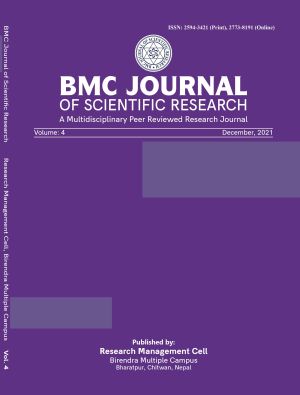Class, Culture and Principles: Evaluating the Chinese Cultural Revolution on the Basis of its Aims and Strategies
DOI:
https://doi.org/10.3126/bmcjsr.v4i1.42242Keywords:
Bourgeois, Cultural Revolution, Collective Interest, Personal-InterestAbstract
Culture in any society is inherited from the past as a form of tradition. It is an automatic and unconscious process. It is usually taken as supra-class unifying category which binds a community. China during Mao proclaimed that old culture serves the interests of the exploiting class and therefore the proletariat as an emerging class should struggle against it and impose its own culture. On this premise ‘the Great Proletarian Cultural Revolution’ was launched. Its aim was to ‘prevent the restoration of capitalism’ by revolutionizing people’s thinking to realize the communist goal of classless society. It lasted from 1966 to 1976, however, debates still continue regarding its aims, principles and practices and achievements or the damages it caused. This article attempts to explore what it actually wanted to accomplish and what strategies and measures were employed to materialize these aims. For this purpose it uses the documents published by the Communist Party of China during that period as the primary sources and judges them on the basis of Marxist socialist principles. The paper reaches to the conclusion that the Cultural Revolution adopted principles, policies and methods which accord with Marxism.
Downloads
Downloads
Published
How to Cite
Issue
Section
License
Copyright (c) 2021 Research Management Cell Birendra Multiple Campus, Bharatpur, Chitwan, Nepal

This work is licensed under a Creative Commons Attribution-NonCommercial-ShareAlike 4.0 International License.




